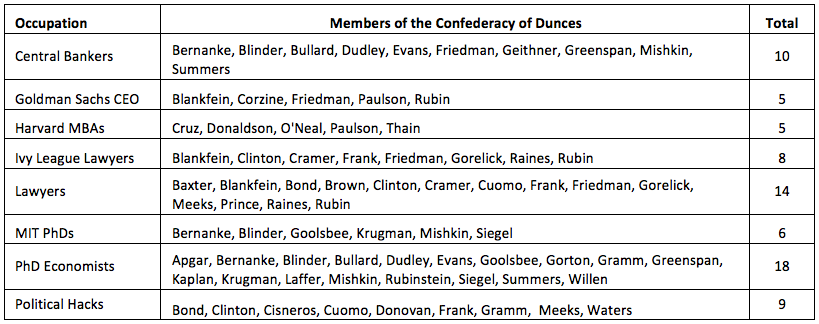What does a 92er do?
The previous blog post - “Why the 92ers?” - discussed the origin of the term “92ers” and its significance to the financial crisis. The term’s origins lay in the fact 92% of Harvard undergraduates were on the Dean’s List. The statistical impossibility of this was shown by the role Harvard alumni played in the financial crisis. In particular, there was a conflict between the plaudits earned by Harvard undergraduates and the enormous havoc they wrought as Harvard alumni. This conflict was resolved by arguing that elite universities nurture and inculcate enormous psychological defects. These then give many of their graduates “a completely false sense of self-importance and omnipotence to exert enormous influence over a future they couldn’t foresee, and to unleash forces they couldn’t comprehend.” The term “92ers” was designed to capture the human factors and psychological defects at the root of the financial crisis.
This is all pretty strong stuff - especially so when schools like Harvard and other elite schools are supposed to have all the smartest students. However, even this notion of elite schools having some sort of monopoly on elite students doesn’t withstand even cursory scrutiny. A simple review of the industries that form the bedrock on which modern society is built with the industries at the core of the financial crisis demonstrate the pernicious nature of many Ivy League and elite school educations.
As some proof of the simple practical insignificance of the Ivy League to the technical bedrock of modern society is my own working career. I completed graduate school (mechanical engineering) in 1991. After serving four years in the Air Force - where there wasn’t an Ivy League or elite school graduate to be seen – I have since worked in the petrochemical, oil refining and power generation industries. It is no stretch to say these industries –provide the technical and physical cornerstones on which all the comforts and conveniences of modern society are built. The numbers of Ivy League graduates I have encountered after more than 20-years of work in these hugely important, foundational industries is precisely zero.
In sharp contrast, when we review the “industries” at the core of the financial crisis – central banking, economic departments, Wall Street finance, government and the media – we find that these fields are absolutely dominated by Ivy League – and other elite school - alumni. In fact, the contrast between the fields at the core of the financial crisis, dominated as they are by Ivy League graduates, and the virtual absence of Ivy League graduates in the fields that modern society is built on demands an explanation. There has to be a reason for this; it can’t be the result of mere coincidence.
A somewhat comical synopsis of the contrast between the industries at the foundation of society, and those that employ “92ers” can be seen by one of the recent “Planet of the Apes” movies. In this movie, a small group of humans wanted to restore a hydroelectric power plant, but the dam was in area controlled by apes. The leader of the apes, Caesar, allowed the work on the dam. However, one of Caesar’s rivals for power was against allowing the humans to repair the power plant. The rival argued that once humans had electrical power, they would be well on their way to recovering their former place on earth. This ape recognized the seminal importance the power industry plays to mankind’s place on earth, and precipitated a war to prevent the humans from repairing the power plant. If, on the other hand, the humans in the movie had wanted to rebuild a Wall Street bank, a branch of the Federal Reserve or an economics department– all of which are dominated by Ivy League graduates – the apes probably would have done the work for us!
In the chart below, the Confederacy of Dunces has been organized around occupational fields and college degrees.

Several important facts and inferences about both the Confederacy of Dunces and the financial crisis are made immediately obvious by this simple chart;
- The number of PhD economists, (18), makes it clear that the PhD in economics is, far and away, the most useless degree in academia – and that is really saying something today.
- The notion that the financial crisis was a consequence of laissez-faire capitalism or an inadequate financial regulatory infrastructure is belied by the number of lawyers, (14).
- The large number of lawyers is a reflection of the ease which great political and legal power is transformed into enormous wealth in today’s crony capitalism or crapitalism.
- The notion that the financial crisis was a consequence of laissez-faire capitalism is also belied by the number of central bankers – read central planners, (10).
- A distinction should be drawn between the people who earn an MIT PhD in useful fields like physics or mechanical engineering, and the dolts who earn theirs in economics.
At this point, the main thing to understand is that the industries – and individuals – at the core of the largest economic crisis since the Great Depression share a distinguishing feature – an enormous number of Ivy League and other elite university degrees.
Peter Schmidt
12 MAY 2018

